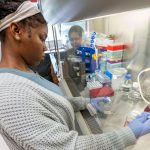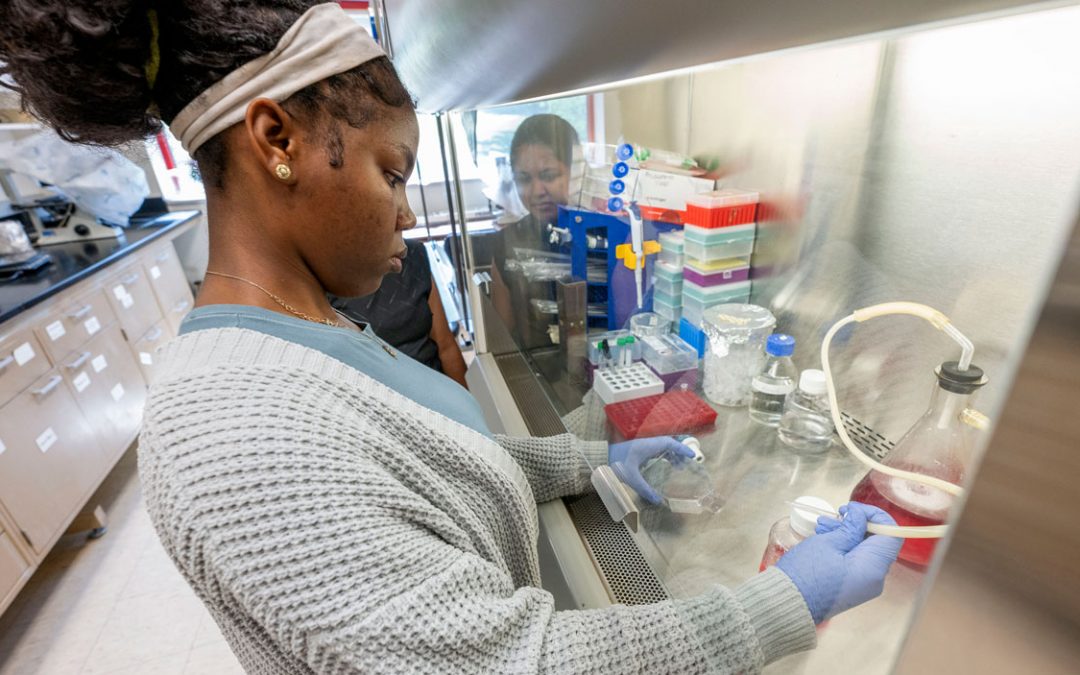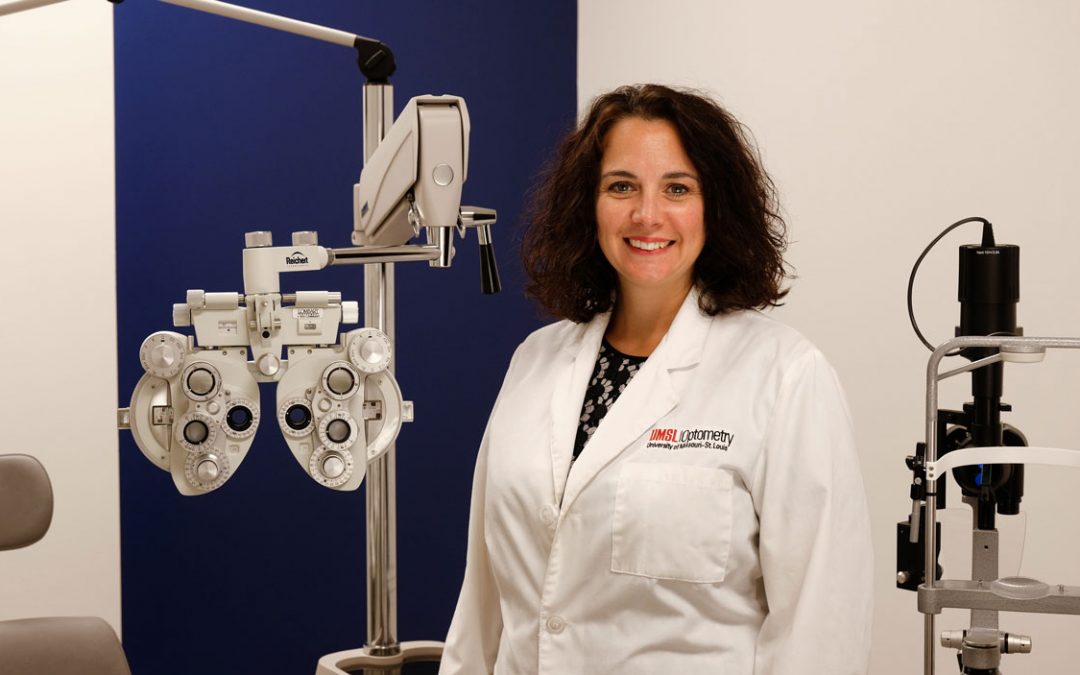
Assistant Professor Annah Bender and Professor Baorong Guo received a $199,160 two-year research grant from the Robert Wood Johnson Foundation to study a policy innovation aimed at increasing SNAP participation among Earned Income Tax Credit families by streamlining the application process. Bender and Guo are partnering with two local agencies, Gateway EITC Community Coalition and the St. Louis Area Foodbank, to conduct their research. (Photo by August Jennewein)
Each year, the federal government’s Earned Income Tax Credit program helps millions of low-income families by providing a tax credit based on income and number of children.
Many of the families claiming the EITC are also eligible for the federal Supplemental Nutrition Assistance Program, which provides a monthly benefit to help buy food and subsequently stretch tight budgets. However, due to various accessibility barriers, many eligible families do not claim the SNAP benefits to which they’re entitled.
By the estimates of mRelief, a nonprofit dedicated to making the program more accessible, $13 billion in SNAP benefits go unclaimed every year.
Two faculty members in the School of Social Work at the University of Missouri–St. Louis are trying to determine how that can be changed.
Assistant Professor Annah Bender and Professor Baorong Guo received a $199,160 two-year research grant from the Robert Wood Johnson Foundation to study a policy innovation aimed at increasing SNAP participation among EITC families by streamlining the application process.
“For this particular grant opportunity, the goal is to improve equity-based policy research,” Guo said. “The Robert Wood Johnson Foundation is interested in funding policy innovations to improve equitable access to policies and government assistance programs.”
The Robert Wood Johnson Foundation is the nation’s largest philanthropy organization focused solely on public health, and one of its key areas of focus is healthy children and families. When the organization solicited research proposals for policy innovations to help children and families, Bender and Guo thought it was the perfect opportunity to collaborate.
Bender’s research interests include improving child welfare and reducing childhood adversities, while Guo’s research has focused on social policy and socioeconomic development of disadvantaged populations.
“That’s how we came together on this process,” Bender said. “We view, potentially, this kind of policy innovation, this streamlined process as being really helpful for families. We’re targeting low-income working, EITC-eligible families with kids at age 8 and under.
“The idea is that getting more people who are eligible for SNAP to receive and access those benefits could over time save families’ limited financial resources for other household necessities and potentially improve household food security.”
To study this idea, Bender and Guo are partnering with two local agencies, Gateway EITC Community Coalition and the St. Louis Area Foodbank.
Every tax season, Gateway EITC sets up service sites in the St. Louis area to provide free federal and state tax preparation services, including filing for the EITC, for individuals and families earning less than $57,000.
To streamline the SNAP application process, representatives from UMSL, Gateway EITC and St. Louis Area Foodbank will be present at these sites in January to identify SNAP-eligible families and provide on-site application assistance.
By using the documents already needed to file for the EITC, Bender and Guo are aiming to combine two separate application processes that can be burdensome, especially for working families.
“One of the biggest barriers for people to access SNAP is the complicated application process,” Guo explained. “Some of these families don’t know where to get help with their application.”
Bender noted that she and Guo will go through training with the St. Louis Area Foodbank on the application process themselves. The application can be more than a dozen pages long and requires a number of financial and personal documents, access to technology and a scheduled call with a state employee.
“Speaking as someone who is a social worker and was a social work practitioner for years who helped people access benefits like food stamps, social security disability, low-income housing, Medicaid, I do not think that the ‘general public’ sometimes understands or appreciates how difficult it can be to access benefits that you are entitled to,” Bender said.
Bender and Guo plan to start collecting data toward the end of January, which marks the beginning of next tax season. Their goal is to provide enrollment assistance for 100 families. They will also implement a rigorous evaluation process to analyze the results.
“We want to see six months later whether they have been enrolled in SNAP, and if that’s the case, then whether there’s an improvement in their food security status,” Guo said.
Bender also plans to conduct qualitative research with 20 families. She’ll survey 10 families who went through with the application process and received benefits and 10 families who did not complete the process. She’s interested in hearing what they thought about the process, how it was helpful and how things could be improved. She’ll also investigate why families ultimately did not enroll.
Guo said the idea to streamline application processes for federal assistance programs is not new and has been pursued in other states, but there hasn’t been any scientific evaluation on how well those efforts worked. If the study produces positive results, she’s optimistic about the impact it could have in the future.
“If we have some evidence, then this might be something that we can consider on a larger scale,” Guo said. “So hopefully this will not only benefit those low-income families in the St. Louis area but also similar programs in other states.”
Bender agreed and commended Gateway EITC, St. Louis Area Foodbank and the Robert Wood Johnson Foundation for their work and support.
“I think it’s going to be a really great project,” Bender. “I love the idea of doing research in our community with buy-in from our community, with people that are doing the work on the ground.”














